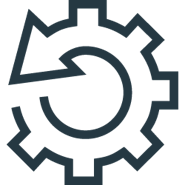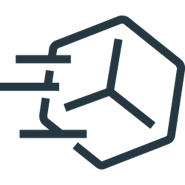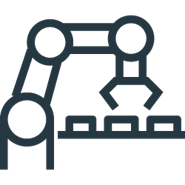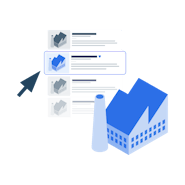Metal Binder Jetting 3D Printing Service
Upload your CAD files to get an instant quote on parts. Free shipping on all US orders.
Use Metal Binder Jetting for Fast and Affordable Metal Parts
Metal binder jetting technology is a 3D printing technology used to make complex metal parts with excellent mechanical properties. Our partnership with ExOne provides on-demand production capacity with the latest binder jet machines and high-performance metal alloys and composites.
Metal binder jetting is often used to produce metal binder parts at fraction of the cost of other metal processes with virtually no design limitations. Binder jetting machines have large build areas and produce parts at high speed, making it an excellent option for low to medium batch, rapid turn parts. The speed and affordability of binder jetting make it perfect for industries that need high strength parts such as industrial, automotive, consumer products, oil, and gas industries.
Xometry Metal Binder Jetting Printing Capabilities
| Feature | Description |
|---|---|
Feature Build Size | Description 15" x 10" x 10" (400 x 250 x 250 mm) |
Feature General Tolerances | Description Depending on the part’s size and geometry, parts may shrink 0.8%–2.5% during cooling. Internal geometries, such as slots and holes, may shrink as much as 5% |
Feature Layer Height | Description 0.004” (0.1 mm) |
Feature Surface Roughness | Description 30 to 200 µin Ra, depending on build orientation, finish, and material used for the build |
Feature Density | Description 95%+ for infiltrated, 98%+ for single alloy. Density is homogeneous. |
This table depicts the general tolerances for Metal Binder Jetting. Stresses during the build and other geometry considerations may cause deviation in tolerances and flatness. Part designs with thicker geometries, flat or broad parts, and parts with uneven wall thicknesses may be prone to significant deviations or warp. Improved tolerances may be possible with a manual quote review, after successful completion of a prototype build, and must be approved on a case-by-case basis. General tolerances apply before secondary finishing or post-processing unless otherwise specified. Please check out Xometry's Manufacturing Standards for more information on tolerances per process.
What is the Metal Binder Jetting Process
Metal binder jetting is an additive manufacturing metal printing technology that builds metal parts from a CAD file in a multi-step process. Binder jet machines first fuse layers of metal powder together with a binding agent. Once the part is bound, the resulting shape is called a green part and is left to cure. The cured form is then put into a furnace to sinter or be infiltrated with bronze.
Since binder jet parts are supported by unused powder on all sides of the part, this eliminates or minimizes the need for post-processing. Note that since most binder jet parts must undergo a furnace stage, parts are prone to shrinkage, are slightly porous, and fine features may not survive. Engineers should design binder jet parts with design-for-manufacturing principles in mind.

Metal Binder Jetting Materials Available at Xometry
| Material Name | Description | Data Sheets |
|---|---|---|
Material Name X1 Metal 420i™ | Description 420i is a matrix metal composite material composed of 60% 420 stainless steel and 40% bronze infiltrant. This material offers good mechanical properties and offers excellent wear resistance. Its properties behave similarly to 4140 steel. 420i is 95%+ dense. | Data Sheets |
Material Name X1 Metal 316i™ | Description 316i is a matrix metal composite material composed of 60% 316L stainless steel and 40% bronze infiltrant. This material offers good mechanical properties and offers excellent wear resistance. 316i is easier to tap and post-machine versus 420i. 316i is 95%+ dense. | Data Sheets |
Material Name Single alloy 316L SS | Description A 98%+ dense 316L stainless steel metal with superb corrosion resistance, and excellent feature details. | Data Sheets |
Available Finishes
420i binder jetting metal parts are a composite of steel and bronze. Because of this, material coloration will be bronze-silver on wear points. This can be enhanced or occluded, depending on finishing options such as media blasting, heat patinas, and vibratory media tumbling.
Xometry offers six finishes for X1 Metal 420i and 316i: Zirblast, Tumble Polished, Medieval Pewter, Damascus Steel, Antique Bronze, and Wheat Penny. Single alloy metals are available with Zirblast.
a760.jpg)
Finishes Gallery
3b06.jpg)
3b06.jpg)
This standard finish results in a bright, matte, bronze-to-gray metallic surface. This is provided due to a ceramic bead blast (zirconium silicate bead).
3b06.jpg)
Parts are media tumbled to a semi-gloss polish. Part color is bright bronze with darker gray striations from features inaccessible to the media. Small gaps may still hold small grains of polishing media.
3b06.jpg)
A heat patina is applied, then parts are tumble polished resulting in a dark gray appearance with some bronze shine on protruded features. Parts are coated with a sealant before shipping.
3b06.jpg)
A heat patina is applied to a media blasted surface leaving an even, dark gray, and matte surface. Parts are coated with a sealant before shipping.
3b06.jpg)
A heat patina is applied after tumble polishing to produce a copper-like coloration with darker gray striations from features inaccessible to the media. Parts are coated with a sealant before shipping.
3b06.jpg)
A heat patina is applied and then media blasted, resulting in an even, matte, and copper-like finish. Parts are coated with a sealant before shipping.
Binder Jetting Design Guidelines
| Feature | Design Guide |
|---|---|
Feature Unsupported walls | Design Guide 1.0 mm (0.04'') |
Feature Supported walls | Design Guide 1.0 mm (0.04'') |
Feature Minimum feature size | Design Guide 1.0 mm (0.04'') |
Feature Minimum hole diameter | Design Guide 1.0 mm (0.04'') |
Feature Minimum escape hole diameter | Design Guide 4.0 mm (0.157'') |
Feature Minimum font size | Design Guide Arial 26 or greater |
To see more design-for-manufacturing recommendations, view our Binder Jetting Design Guide.
Best Applications for Metal Binder Jetting

Rapid Tooling
Because binder jet metal parts are strong and affordable, they are widely used for rapid tooling, fixtures, and jigs.

Prototyping
Binder jet metal 3D printing is affordable and fast, and therefore is often used to make rapid to fully functional prototypes.

Mass Production
Highly dense and durable metals make binder jet printing a fantastic choice for end-use products.

Ready to Get a Quote on Metal Binder Jet Parts?
Free shipping available for domestic 3D printing orders ; learn more!
Why Choose Xometry for Metal Binder Jet 3D Printing?

Endless Options
Choose from thousands of possible combinations of materials, finishes, tolerances, markings, and certifications for your order.

Easy to Use
Get your parts delivered right to your door without the hassle of sourcing, project management, logistics, or shipping.

Vetted Network
We are ISO 9001:2015, ISO 13485, and AS9100D certified. Only the top shops that apply to become Suppliers make it through our qualification process.
